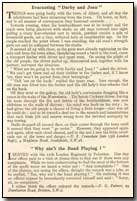Memoirs & Diaries - The Best 500 Cockney War Stories - "Why 'aint the Band Playing?" and Other Stories
 Published in London
in 1921, The Best 500 Cockney War Stories
comprised, in the words of its newspaper publisher (The London Evening
News) "a remembering and retelling of those war days when laughter
sometimes saved men's reason".
Published in London
in 1921, The Best 500 Cockney War Stories
comprised, in the words of its newspaper publisher (The London Evening
News) "a remembering and retelling of those war days when laughter
sometimes saved men's reason".
The collection of short memoirs, some 500 in total, is divided into five categories - Action, Lull, Hospital, High Seas and Here and There. This page contains five stories from Lull, led by "Why 'aint the Band Playing?".
Other sections within the collection can be accessed using the sidebar to the right.
"Why 'aint the Band Playing?"
I served with the 11th London Regiment in Palestine.
One day our officer paid us a visit at dinnertime to find out if there were any complaints.
While we were endeavouring to find the meat at the bottom of the spoilt water we heard a voice say: "Any complaints?"
One of the platoon, not seeing the officer, thought the remark was a joke, so he replied, "Yes, why ain't the band playing?"
On realising it was an official request he immediately corrected himself and said : "Sorry, sir, no complaints."
I rather think the officer enjoyed the remark.
F. G. Palmer, 29 Dumbarton Road, Brixton, S.W.2
His Deduction
Our battalion, fresh from home, all nicely groomed and with new kit, stepped out whistling "Tipperary."
We were on the road to Loos. Presently towards us came a pathetic procession of wounded men struggling back, some using their rifles as crutches.
Our whistling had ceased; some faces had paled. Not a word was spoken for quite a while, until my Cockney pal broke the silence, remarking, "Lumme, I reckon there's been a bit of a row somewhere."
Charles Phillips (late Middlesex Regt.), 108 Grosvenor Road, Ilford
Peter in the Pool
We had advanced beyond the German first line in the big push of '18. The rain was heavy, the mud was deep; we had not quite dug in beyond "shallow," and rations had not come up - altogether a most dismal prospect.
Quite near to us was a small pool of water which we all attempted to avoid when passing to and fro. Suddenly there was a yell and much cursing - the Cockney of the company, complete with his equipment, had fallen into the pool.
After recovering dry ground he gazed at the pool in disgust and said, "Fancy a fing like that trying to drahn a bloke wiv a name like Peter."
J. Carlton, Bayswater Court, St. Stephen's Court, W.2.
Where "Movie" Shows Cost Soap
We landed in North Russia in June 1918.
We were piloted in on the City of Marseilles to a jetty. We did not know the name of the place. On the jetty we saw from the boat a British marine on sentry duty.
We shouted down to him, "Where are we, mate?" He answered "Murmansk."
We asked, "What sort of place," and he shouted, "Lumme, you've come to a blighted 'ole 'ere. They 'ave one picture palace and the price of admission is a bar of, soap."
M. C. Oliver (late Corporal R.A.F.), 99, Zealand Road, Stamford Hill, N.16
Sherlock Holmes in the Desert
In the autumn of 1917, when training for the attack on Beersheba, in Palestine, we were encamped in bivouacs in the desert.
The chief meal of the day was served in the cool of the evening and more often than not consisted of bully beef stew.
One evening the Orderly Officer approached the dixie, looked into it, and seeing it half full of the usual concoction, remarked, "H'm, stew this evening."
At once there came a voice, that of a Cockney tailor, from the nearest bivouac - "My dear Watson!"
R. S. H. (late 16th County of London Q.W.R.), Purley, Surrey
Next - The Army "Loops the Loop" and four other stories
Russia mobilised 12 million men during the war; France 8.4 million; Britain 8.9 million; Germany 11 million; Austria-Hungary 7.8 million; Italy 5.6 million; and the USA 4.3 million.
- Did you know?
